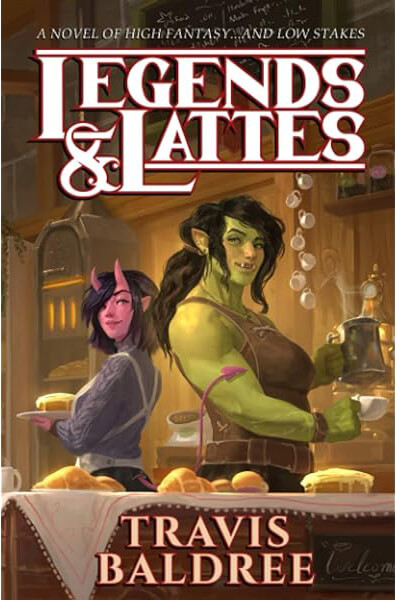After twenty-two years of adventuring, Viv had reached her limit of blood and mud and bullshit. An orc’s life was strength and violence and a sudden, sharp end – but she’d be damned if she’d let hers finish that way. It was time for something new.
Once upon a time, in the long-ago era known as Being In College, I used to play Dungeons & Dragons. I fondly remember the long-term games, where the goal was to get as much money as possible so your character could eventually have enough to buy a castle and settle down in comfort.
This, mostly, is where Travis Baldree’s Hugo-nominated novel begins.
Viv isn’t interested in castles though. After one last battle, collecting one final piece of treasure, she walks out on her adventuring group without even bothering with a proper goodbye. But her decision to go is anything but abrupt. She has a plan she been preparing for years, and she finally has everything she needs to set up a little place and share a luxury that’s so exotic most people in the town of Thune have never even heard of it.
As she left, Ansom hollered after her. “Oh, and hey! What in the eight hells is coffee?”
I don’t think I’ve run into the term “cozy fantasy” before now, but it’s a genre that’s growing more and more prominent. I’ll be the first to admit that the current state of the world feels very precarious, so having something fun and cute and comfy to retreat to for a while is a great way to decompress.
If you want an epic fantasy novel with lots of death and political machinations then there’s lots of options for you, because you’re not going to get that here. There’s way more details in this book about chalkboard menu drawings and innovations for making a seating area more comfortable than there is drama and violence. So much of the story involves things that I would happily sit and daydream about when I’m trying to relax, like the step-by-step renovations involved in turning a run-down horse livery into the Best Coffee Shop In The World. Or a shopping trip to the weekly outdoor market to buy a lovingly detailed list of supplies for the new café, from pottery to cutlery to tables and rugs. Or an entire scene devoted to the process of making a new delicacy known as cinnamon rolls, created by Viv’s baker, a lucky find who’s hardworking, dazzlingly talented, and also adorable.
The interactions with other people (many of whom are fantasy races other than human) is another element that’s surprisingly calming, and occasionally uplifting. As an orc, Viv is pretty imposing. The usual trope would be for mothers to pull their children aside in terror, or at least one bartender to hand out a “we don’t serve your kind in here.” But no, every interaction as Viv starts putting her dream into motion is somewhere on the spectrum between polite and delightful. Even the nosy neighbor woman across the street refuses to fall into a stereotype, and Viv’s way of dealing with everyone, including old friends and people she’s looking to hire for her business, is straightforward and filled with empathy.
The book might be a how-to manual for the best way to treat people. This is how you welcome a stranger to town. This is how you sincerely apologize for leaving without a goodbye, in a way that doesn’t try to make it someone else’s fault. This is how you find employees who actually like doing the work you need done, and how to listen to their input. This is how you stay aware of how your presence might make other people feel, and how to gently let them know you’re not a threat. (Viv is a little sensitive of how intimidated people might be of orcs, although she has good luck with choosing friends and employees who know how to diffuse any bad feelings.)
Cal shrugged. “Not in the habit of offerin’ my less than positive thoughts to somebody like you.”
“Somebody like me?” She sighed. “You mean—?”
“I mean somebody who’s payin’.”
There’s quite a bit about people learning to reinvent themselves, or trying to make the world understand that they’re different from what everyone expects them to be. Viv is trying to reject the warrior life that would be so easy to fall back into in order to solve problems, because she wants her life to be about what she’s making now. Viv’s first hire is Tandri, a succubus; Tandri has no intention of seducing customers, and it’s clear that she would LIKE for people to stop ASKING about it. Even the occasional antagonist – and there are a few of those – aren’t always what we’re expecting them to be (except when they are, which is satisfying in its own way.)

Cozy fantasy is generally heavy on world-building and light on plot; the tagline of the book after all is “A Novel of High Fantasy and Low Stakes”. But there is some peril here. Part of it is the everyday peril of a café’s worst fate: nobody showing up on opening day. Some of the peril is a little more dire; Viv has to deal with some betrayal, and a little light mob activity. And then there’s the will they/won’t they between Viv and Tandri, as the both of them dance around the risk of being attracted to someone who can’t get out of their own way, or can’t imagine the other person could possibly have feelings for them. It’s possibly the highest stakes in the book, but it’s a peril of a comfortable working relationship and devoted loyalty and the perfect picnic you can imagine, so I think it’s a peril even the most risk-averse reader can handle.